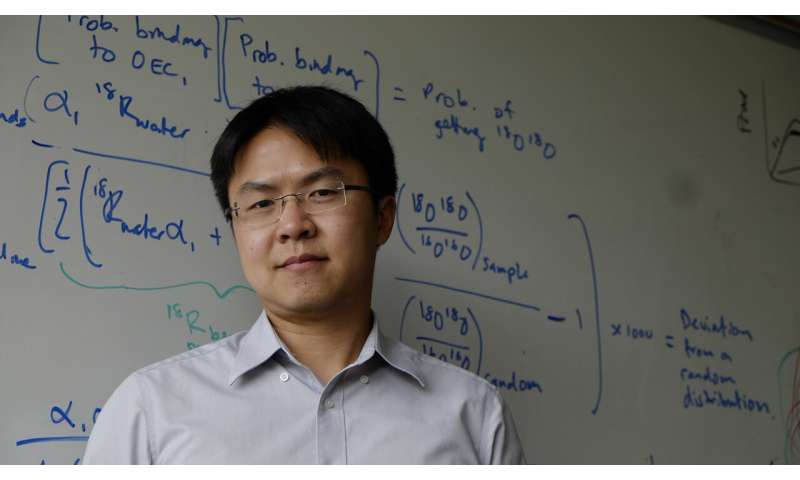Scientist goes deep to improve environmental tracers

With the help of a National Science Foundation (NSF) grant, Rice University geoscientist Laurence Yeung and his team intend to improve scientific analysis of oxygen isotopes recovered over the past few decades from Earth's rocks, oceans and atmosphere.
But their interests truly stretch back more than a billion years.
Yeung, an assistant professor of Earth, environmental and planetary sciences, has earned a five-year, $584,000 CAREER Award to connect theoretical and experimental data on a metric that can give scientists better data about the global biosphere's past and present productivity.
The grant also funds the lab's wish to share what it learns with Houston-area students through annual teacher training activities that focus on global-change science. Working with the Rice Office of STEM Engagement and the Harris County Department of Education, Yeung will host middle- and early-high-school teachers at summer laboratory experiences and an annual daylong workshop.
The goal of the grant's educational component will be to help teachers develop lessons on global-change science and cultivate early connections between the geosciences and core science and math disciplines.
"We have this widening gulf in terms of climate-change education," Yeung said. "Students want to learn about global change, but teachers are reporting that they don't feel prepared to teach it in their classrooms. Few of them have taken college-level courses in the subject; they're learning everything ad hoc. We're hoping to fill that need for formal training, and to help connect global-change science to what teachers are already teaching in their classrooms."
Yeung and his lab study the oxygen atoms in ancient rocks, oxygen in the atmosphere and oxygen dissolved in water. Specifically they look for a trio of stable oxygen isotopes—common O-16 and rare O-17 and O-18—that are closely linked to the productivity of the biosphere, as well as atmospheric chemistry. The amount of each isotope found in samples tells them about how the oxygen got there and from what sources.
"The problem is that labs keep getting contrasting results," Yeung said. "The natural variations in these isotopes are extremely subtle—so maybe it's not surprising—but our understanding of biosphere productivity both in the present and in the past depends on the accuracy of these measurements."
The core of Yeung and his team's efforts will be to resolve these interlaboratory discrepancies and improve estimates of primary productivity in the oceans. They will do so by unifying theory and experiments on the biochemical reactions that drive photosynthesis and respiration, the processes governing biosphere productivity. He and his collaborators recently showed how this could be done using quantum-mechanical simulations of biological enzyme structures and well-calibrated isotope measurements of oxygen gas.
"We can predict the isotopic preferences of different enzyme types, and we can do experiments to understand the effects of other environmental factors like temperature or cell growth rate on oxygen isotopes," he said.
The grant will help the researchers compile and reinterpret the 20 years of existing oceanic field data that use the oxygen-isotope method. "Hopefully we'll tie them all together and say, 'OK, here's a coherent, unified picture,'" Yeung said.
Even then the work won't be done. Yeung's research interests encompass more than a billion years of biosphere history on Earth and other planets. "The same isotope effects may be relevant to records that are trapped in rocks," Yeung said. "The community has found similar discrepancies between the oceanographic data and rock data. There's a translation problem that I'm hoping we can solve there, too.
"And since oxygen is one of many metabolites, the oxygen system could be a model for studying others, say if you're looking for signatures of biological activity anywhere in the solar system."
The Faculty Early Career Development (CAREER) Program is an NSF-wide effort in support of young faculty who have the potential to serve as academic role models in research and education and to lead advances in their fields. The grants, among the most competitive awarded by the NSF, go to fewer than 400 scholars each year across all disciplines.
Provided by Rice University